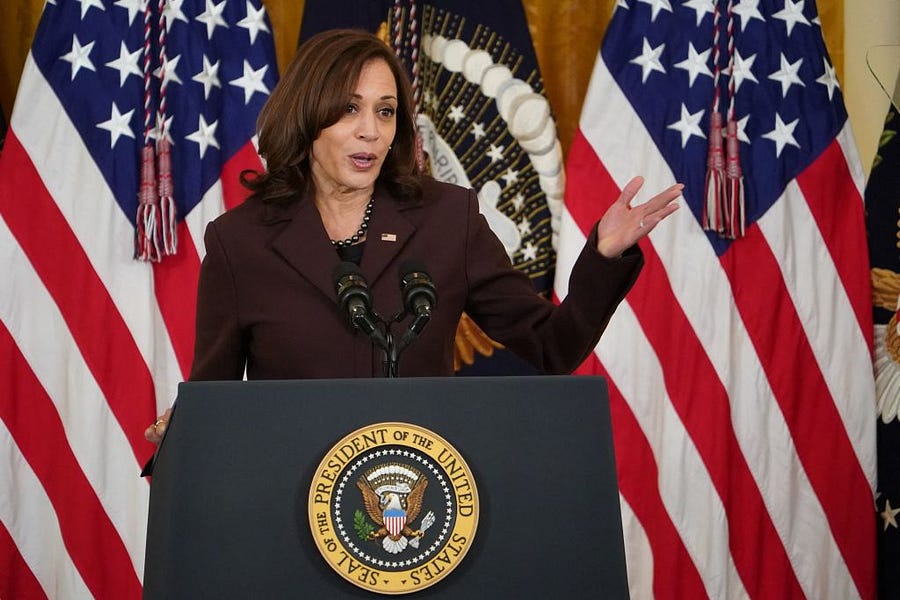Things have not gone well for Vice President Kamala Harris. Not only is she less popular than her boss, but according to one recent poll, she even broke Dick Cheney’s record for most unpopular sitting vice president.
But it’s worse than that. Cheney—fairly or unfairly—was unpopular because a lot of people thought he was in charge. He also shot a guy in the face. It was an accident, but still.
The White House insists there’s nothing amiss in Harris-land, even as much of her senior staff is jumping ship. And that ship is leaking like a sieve. Festivus arrived early on HMS Harris with disgruntled and loyal staffers alike airing grievances on a daily basis.
The complaints cover the waterfront: Harris is no fun to work for. She doesn’t do her homework and then blames the staff when she’s unprepared. “With Kamala,” one former staffer told the Washington Post, “you have to put up with a constant amount of soul-destroying criticism and also her own lack of confidence. So you’re constantly sort of propping up a bully and it’s not really clear why.”
Her defenders blame everyone but her. For starters, Biden hasn’t got her back. They claim, predictably, that right-wing media is racist and sexist. But they also say the mainstream media is “chasing incessantly negative stories and playing into undeniable structural issues of race and gender,” in the words of Politico.
Not even the White House is immune. “It’s hard to miss the specific energy that the White House brings to defend a white man,” says a former Harris staffer, referencing recent support for Transportation Secretary Pete Buttigieg’s decision to take time off when his twins were born. (How far we’ve come when defending a gay Cabinet official’s paternity leave is proof of structural racism.)
Both Biden’s and Harris’ teams insist her staff’s exodus is a non-story. People are tired and want to spend more time with their families, etc. That’s always plausible for specific people. But suffice it to say that if Harris’ star were rising and she were the presumptive Democratic president in waiting, some folks would stick around.
Harris was a bad pick from the start. Her failed presidential campaign seemed to be based on the assumption that Twitter and TikTok likes would win delegates in the Democratic primary. Whatever personal charm she has—or skills she had as a prosecutor or a senator—hasn’t translated for a national audience.
But she was the inevitable pick once Biden decided he needed to select a black woman as his running mate. Her keenest supporters—a very thin slice of Very Online Democratic activists—are trying to cast her travails through the prisms of racism and sexism.
Such defenses strike me as evidence they don’t know how to do any other kind of politics—only the kind where every setback looks racist and sexist.
That mindset is the driver of Harris’ problems. Her supporters seem to believe that the first black female vice president is such a big deal, that everyone—staffers, journalists, the president himself—should work as if she is just too big to fail. Hence all the anger at Biden for not creating more opportunities for her to shine. “It’s a conundrum unique to her,” two CNN reporters explain. “People are expecting their historic vice president to make history every day when in fact she’s trying to carry the duties of a secondary role.”
There’s obviously some truth to that. Putting her in charge of the “root causes” of the border crisis was a recipe for failure.
But since when is it the job of the president to prioritize the political success of the vice president?
For instance, according to the Post, her supporters say Biden’s refusal to push for “wholesale changes to the Senate filibuster” limits her ability to “solve problems” such as immigration and voting rights, presumably because the vice president casts the deciding vote in a tied Senate.
Huh. Of all the arguments good and bad for abolishing the filibuster, it never occurred to me that making Harris look good was one of them. But such ideas make sense when you think your job is to be symbolic and historic.







Please note that we at The Dispatch hold ourselves, our work, and our commenters to a higher standard than other places on the internet. We welcome comments that foster genuine debate or discussion—including comments critical of us or our work—but responses that include ad hominem attacks on fellow Dispatch members or are intended to stoke fear and anger may be moderated.
With your membership, you only have the ability to comment on The Morning Dispatch articles. Consider upgrading to join the conversation everywhere.